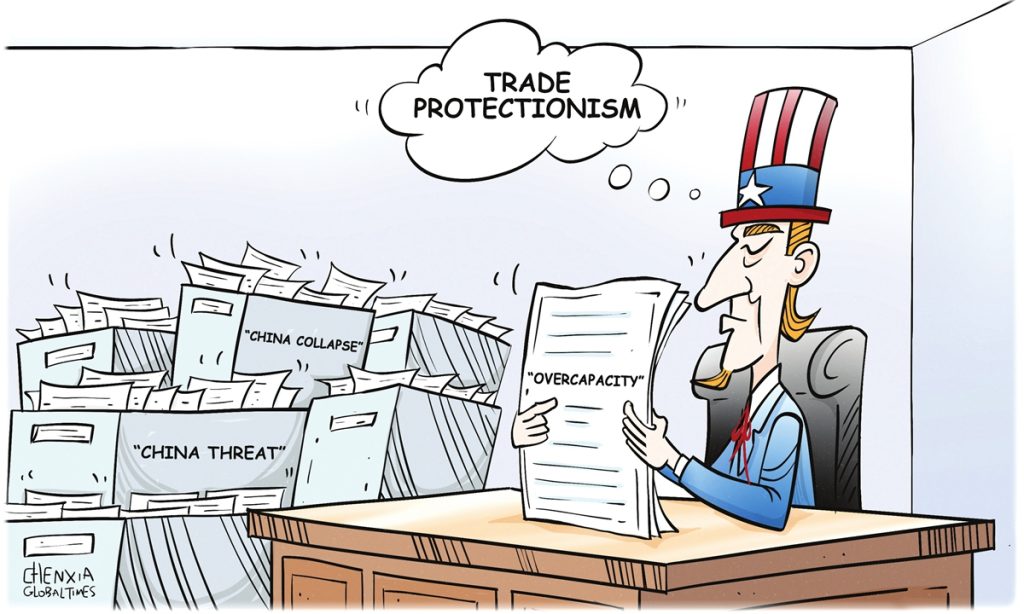There isn't a 'China overcapacity,' but a US overcapacity of anxiety stemming from a lack of confidence: Chinese FM

The US accusation of "China's overcapacity" is not a market-driven conclusion, but a crafted narrative to manipulate perception and politicize trade, with the real purpose being holding back China's high-quality development and depriving China of its legitimate right to development, Lin Jian, spokesperson from China's Ministry of Foreign Affairs, said at a routine press briefing on Tuesday, in a latest response to Washington's false narratives targeting Chinese new energy vehicles (NEVs).
There isn't a "China overcapacity," but a US overcapacity of anxiety stemming from a lack of confidence and smears against China, the spokesperson said.
The remarks were made in response to media questions regarding the rhetoric by US Secretary of State Antony Blinken during his recent visit to China. He pointed fingers at China over so-called "unfair trade practices and the potential consequences of industrial overcapacity to global and US markets," naming some industries including electric vehicles, batteries, and solar panels.
The "China overcapacity" accusation may look like an economic discussion, but the truth is, the accusation is built on false logic and ignores more than 200 years of the basic concept of comparative advantage in Western economics, Lin said.
When China's electric vehicle exports account for only 12 percent of its production, it's labeled as "overcapacity." But consider this: Germany exports 80 percent of its automobile production, followed by Japan's 50 percent, and the US' 25 percent.
"Wouldn't that be considered more serious overcapacity?" Lin asked.
Moreover, according to estimates from the International Energy Agency, to realize carbon neutrality, the world will need 45 million NEVs by 2030, 4.5 times that of the demand of 2022.
"When the global capacity is still far below the market demand, how could there be overcapacity?" Lin asked.
In contrary to the US' narrow-minded narratives in new energy development, China has taken an open stance in the field, welcoming businesses worldwide to develop cooperation together for win-win outcomes, as it is well reflected at the 2024 18th Beijing International Automotive Exhibition Beijing Auto Show, which takes place from April 25 to May 4.
The auto show features more than 1,500 exhibiting companies, 278 new energy models and 117 global premieres, including 30 premieres by multinational companies.
The event was attended by executives from renowned international car companies such as BMW, Volkswagen, and Nissan, demonstrating their regard for the Chinese market and their expectations for working more closely with China.
Recently, German carmakers Volkswagen and BMW announced additional investments in China totaling five billion euros each, aiming to ramp up their layouts in the manufacturing of electric and smart vehicles in China.
These facts and statistics not only reveal global automakers' optimism for the growth potential of China's mega-sized market and their confidence in China's development outlook, but also are the most convincing argument against the so-called "Chinese overcapacity," Lin said.
Chinese experts also refuted the US' intensified discourse of "overcapacity" narratives.
Speaking with the Global Times on Tuesday, Cui Dongshu, secretary-general of the China Passenger Car Association, said that actual demand for NEVs remain huge in both China and around the world.
The NEV market in China is undergoing rapid expansion, and the implementation of the new trade-in policy alone has the potential to drive up to two million electric vehicle sales this year, according to Cui, reflecting positive market prospects for the booming sector.
Overcapacity is only caused by enterprises lacking competitiveness, leading to unsold inventory, which is surely not the case in China's NEV industry, Cui said, noting that Chinese NEV manufacturers are reputable enterprises, and there is strong demand for their products in the market.
"Both domestically and internationally, there is no overcapacity in the NEV sector," he said.
The US' repeated accusations of "overcapacity" against China stem from concerns about the rapid development of China NEV industry potentially impeding the growth of American car manufacturers. "This highlights the narrow-minded approach of the US in attempting to isolate Chinese companies from the global market," said Cui.